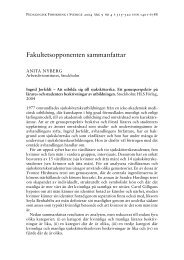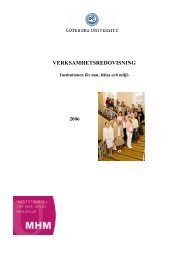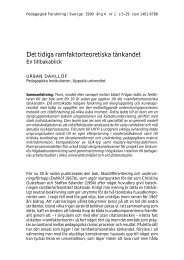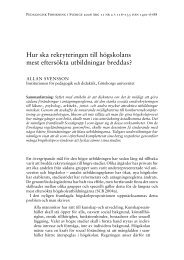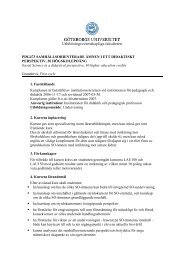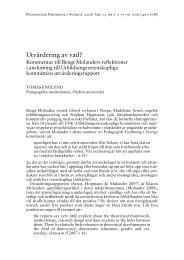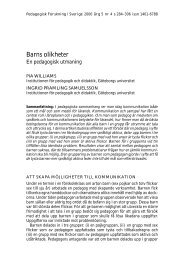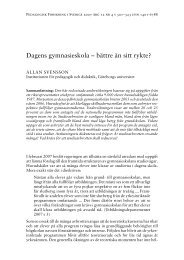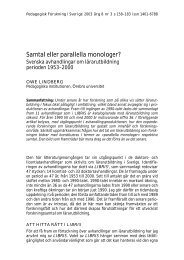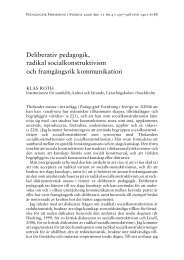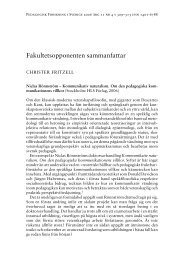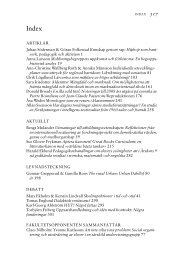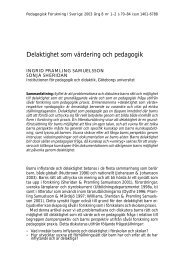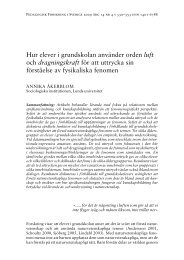University of Oslo Workshops June 29-30 Conference July 1-3 ...
University of Oslo Workshops June 29-30 Conference July 1-3 ...
University of Oslo Workshops June 29-30 Conference July 1-3 ...
You also want an ePaper? Increase the reach of your titles
YUMPU automatically turns print PDFs into web optimized ePapers that Google loves.
Track B PIRLS - Session 7<br />
Effects <strong>of</strong> Student Motivation and Attitudes on Reading<br />
Achievement<br />
3 <strong>July</strong><br />
10.00-12.00<br />
Room: AK 2137<br />
Chair: Hanna Eklöf<br />
Discussant: Marjeta Doupona Horvat<br />
Influence <strong>of</strong> the Home Literacy Environment on Reading Motivation and<br />
Reading Comprehension<br />
Ann M. Kennedy, TIMSS & PIRLS International Study Center, Boston College, USA<br />
Kathleen Trong, TIMSS & PIRLS International Study Center, Boston College, USA<br />
This research used PIRLS 2006 data to explore home factors that influence students’<br />
motivation to read, as well as the relationship between student motivation and reading<br />
achievement. The research employed structural equation modeling to empirically test a<br />
theoretical model <strong>of</strong> student motivation to read and home factors that may influence<br />
motivation, including parental attitudes and behaviors, early literacy activities, and the<br />
presence <strong>of</strong> children’s books. In addition, the theoretical model tested the relationship<br />
between motivation and student reading achievement. Lastly, differences in the<br />
relationships among these variables were examined for boys compared to girls. This<br />
research will contribute to the body <strong>of</strong> literature on the influence that the home literacy<br />
environment can have on reading motivation and reading comprehension, and may help<br />
inform analysis and reporting strategies for future cycles <strong>of</strong> PIRLS.<br />
Keywords: parent attitudes; motivation; reading achievement; early literacy; structural<br />
equation modeling<br />
The Varying Relationship between New Zealand Students’ Attitude to<br />
Reading and Reading Literacy Achievement<br />
Elliot Lawes, Ministry <strong>of</strong> Education, New Zeeland<br />
<br />
Results from the 2006 Progress in International Reading Literacy Study (PIRLS) show that<br />
for New Zealand’s Grade 4 students, those with a more positive attitude to reading tended<br />
to have higher reading literacy achievement (Chamberlain, 2007; Mullis, Martin, Kennedy,<br />
& Foy, 2007). However, in their analysis <strong>of</strong> PIRLS data English-speaking countries,<br />
Gnaldi, Schagen, Twist, and Morrison (2005), suggest that for Grade 4 students with low<br />
reading literacy achievement, the measure <strong>of</strong> attitude to reading requires careful<br />
interpretation due to those students’ difficulty understanding the items comprising this<br />
measure. This suggests the possibility <strong>of</strong> variation, with reading literacy achievement, in<br />
the relationship between attitude to reading and reading literacy achievement. The current<br />
study uses correlation curves (Bjerve & Doksum, 1993) to investigate this variation in New<br />
Zealand’s PIRLS 2006 data. It finds that, overall, the correlation between attitude to<br />
58



